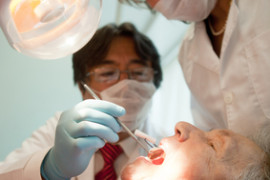New research from Japan suggests curcumin might play a significant role in reducing the growth of oral pathogens due to its natural antibacterial properties. Results of the study were published in the Journal of Periodontology.
Curcumin is a natural phenol that is most commonly found in the spice turmeric—regularly found in Indian, Thai, and Indonesian food. It is known to be helpful in reducing inflammation and some evidence suggests it might be beneficial in suppressing tumor growth and warding off digestive problems, Alzheimer’s disease, and even cholesterol.
In the study, even very low concentrations of curcumin were successful in almost completely stopping the growth of P. gingivalis, Prevotella intermedia, Fusobacterium nucleatum, and Treponema denticola.
In contrast, even high doses of curcumin did not disrupt the growth of Aggregatibacter actinomycetemcomitans.
This is not the first study to demonstrate that curcumin is successful at reducing oral biofilm. Earlier this year, researchers concluded that, out of 48 polyphenols tested, curcumin was the most effective at reducing multi-species biofilms.
Periodontal disease is a complex oral and systemic disease that affects more than 80% of the adult population in the United States. It is due primarily to polymicrobial infection (oral biofilm), and is influenced by lifestyle factors such as genetics, stress, sleep, physical activity, and diet/nutrition. Left unaddressed, this biofilm incites an inflammatory cascade throughout the body that leads to pathology and disease.
Insurance company studies have shown that the fastest way to improve lives and reduce healthcare costs is to address the impact of oral infection and inflammation on systemic disease. Curcumin appears to show promise as one way of reducing the microbial burden of oral biofilm.
Source: Antibacterial Activity of Curcumin Against Periodontopathic Bacteria



